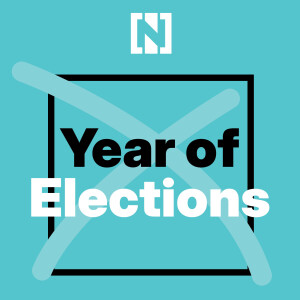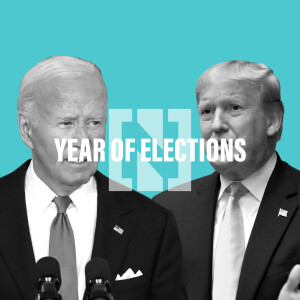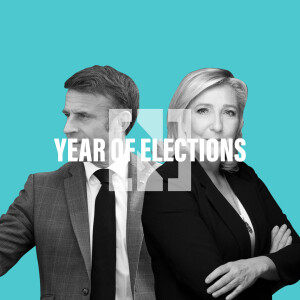Episodes

Wednesday Nov 06, 2024
Wednesday Nov 06, 2024
Donald Trump and JD Vance will be the 47th president and vice president of the US after securing a win in a contentious race with Vice President and Democratic candidate Kamala Harris.
From Pennsylvania and Wisconsin to Georgia, tensions and turnout appeared high as the ballot boxes opened for a historic US election after a fatiguing campaign trail and record early voter turnout.
It’s an election only Americans participate in but whose results the rest of the world must contend with, particularly as wars continue in the Middle East and Ukraine.
Regional leaders were some of the first to congratulate Mr Trump on his win, and from afar in Palestine and Lebanon, people have expressed their hopelessness for this election.
Mr Trump is now the oldest person to be elected president of the US and the first convicted felon in the office, with a policy on the Middle East that’s decisive and vocal in contrast to that of the Biden-Harris administration.
With Arab Americans at an unlikely centre of this cycle, questions linger about politics, policy and the potential for change both at home and in the Middle East.
In this special episode of the Year of Elections podcast on the US race, we are on video in studio with Paul Salem, vice president of international engagement at the Middle East Institute and Mina Al-Oraibi, our editor in chief here at The National.
This episode was produced by Doaa Farid and Yasmeen Altaji. Our multimedia producer is Mahmoud Rida, and our audio engineer is Arthur Eddyson.

Friday Nov 01, 2024
Friday Nov 01, 2024
The US election on November 5 will be historic, as has been the race leading up to it. In the early stages of the campaign, this was the first election between a sitting president and a former president in more than 60 years. In June there was the earliest presidential debate in history between Joe Biden and Donald Trump, soon after which Mr Biden dropped out of the race and endorsed his Vice President, who secured and accepted the Democratic party's nomination for the presidency.
This election cycle is rife with tension and conflict, packaged with information about swing states and an electoral college that voters and onlookers can find daunting. It comes with war raging in the Middle East, Russia's full-scale invasion of Ukraine close to its three-year mark, and worries at home, from recent natural disasters to economic woes.
With the White House up for grabs, we’re taking a look at what makes up a US election race, with Arab Americans and war in the Middle East unexpectedly to the fore.

Monday Oct 28, 2024
Monday Oct 28, 2024
The US election on November 5 will surely be one of the most consequential in recent memory.
Former president Donald Trump and Vice President Kamala Harris are competing for the Oval Office in what seems like a rippled reflection of the contest we saw between Mr Trump and Joe Biden in 2020.
Still, the race is seeing a lot of the unexpected: Mr Trump courting Arab American voters, and Ms Harris campaigning with Liz Cheney (the daughter of former Republican vice president Dick Cheney). Polls show both candidates grasping at narrow leads and, depending on where you look, trading places.
American voters – and global onlookers – are left with plenty of unanswered questions.
In the shadow of Israel’s war in Gaza and Lebanon, and Russia’s continuing war in Ukraine, one question is: What does each candidate’s foreign policy look like, particularly when it comes to the Middle East?
That’s the question host Sulaiman Hakemy asks in this episode of Year of Elections.

Thursday Oct 17, 2024
Thursday Oct 17, 2024
Elections in the semi-autonomous Kurdistan Region of Iraq are a key measure of its capacity for self-governance and democracy.
This year, the parliamentary election takes place amid internal divisions within Kurdish political parties. It comes 10 years since ISIS invaded Iraq, in an ethnically and religiously diverse part of the country where demographic divides are stark and tension runs high.
But this year, there’s something else in the mix: the sitting Kurdish Parliament is two years beyond its maximum term, rendered functionally illegitimate.
In a year of watershed elections across the Middle East, the one set to take place in the Kurdistan Region of Iraq on October 20 is nothing less. The semi-autonomous region in Iraq with its own constitution, parliament and capital city.
Its parliament has long been dominated by the Kurdistan Democratic Party (KDP). This year, its rival, the Patriotic Union of Kurdistan (PUK) is trying to make a comeback.
Voters are expected to head to the polls as economic worries run high and minority groups have lost their quota seats.
For many Kurds, these elections feel like more of the same. But could this year be different?
In this episode of Year of Elections, Yasmeen Altaji hears from politicians and experts to answer the questions: what happened and what comes next?

Tuesday Oct 01, 2024
Tuesday Oct 01, 2024
In 2021, Tunisian President Kais Saied’s name began making headlines in ways it hadn’t before.
It was the height of the Covid-19 pandemic. People were making allegations about police brutality, and many were struggling to make ends meet.
So, Tunisians took to the streets in protest.
Mr Saied’s response was to dissolve the government, circumventing ordinary legal procedures. He cited the need to make amendments to the country’s constitution and political system. It was a popular move. The country had been in economic decline for years, a situation many attributed to the democratic system set up in the aftermath of the country’s uprising in 2011.
Before he became President, Mr Saeid was an acclaimed legal scholar, specialising in constitutional law. In 2019, he ran for office on a platform of decentralising the Tunisian government and promoting an indirect democracy.
But although Mr Saied remains popular, many fear that in the three years since his dissolution of the government, the President’s growing centralisation of authority has resulted in more of the very mistakes he says he sought to avoid. Today, Tunisia suffers from persistently high inflation, shortages of essential goods and a high national debt.
Now, Tunisia is gearing up for another presidential election on October 6, as Mr Saied seeks to extend his power.
In this episode of Year of Elections, host Sulaiman Hakemy and The National’s North Africa correspondent, Ghaya Ben Mbarek, discuss how Tunisia got to where it is today and what to expect ahead of the election.

Friday Sep 13, 2024
Friday Sep 13, 2024
American presidential debates are the centrepiece of the US election cycle.
They’re a chance for voters to see contenders for the White House face each other, not just the public.
The last time we saw Donald Trump take the debate stage, he was standing across from President Joe Biden. Just weeks after that, Mr Biden dropped out of the race, and his Vice President, Kamala Harris stepped in.
On September 10, Ms Harris and Mr Trump met for the first time on the debate stage – more precisely, they met for the first time ever – for an hour and a half of questions, answers and rebuttals.
From awkward handshakes to muted mics, personal digs and live fact-checks, we discuss Tuesday night’s debate and what it means for Republicans and Democrats just over a month out from a historic American presidential election.

Friday Sep 06, 2024
Friday Sep 06, 2024
On Saturday, Algeria will go to the polls again, and this time around the election is expected to be contentious, to say the least.
Three candidates are vying for what could be a trajectory-changing term for Algeria.
They are incumbent Mr Abdelmadjid Tebboune, returning to the ticket after rising to his first term following the 2019 Hirak protest movement; Youcef Aouchiche, a former member of parliament running with the Socialist Forces Front; and Abdelaali Hassani Cherif, a civil engineer running on promises of socio-economic stability with the Movement of Society for Peace.
Algeria’s seeking a main stage role in regional politics as instability between neighbours expands and intensifies, and voters are apathetic towards the races.
What can these candidates provide? What’s setting them apart?
On this episode of Year of Elections, host and Opinion Editor Sulaiman Hakemy hears from Zine Ghebouli, an analyst and fellow on Algeria at the Arab Reform Initiative and the European Council on Foreign Relations, and Ghaya Ben Mbarek, The National’s North Africa Correspondent, who has been closely following the election in her coverage.

Thursday Aug 22, 2024
Thursday Aug 22, 2024
In our previous Year of Elections episode, we looked ahead to the Republican and Democratic National Conventions. A lot has changed since.US Vice President Kamala Harris has moved up the ticket and is now running for the presidency. She will be the one to take on former president Donald Trump for the White House.
After all, this is a historic election. Mr Biden is the first sitting president in more than 50 years to drop out of a presidential race and his anointed successor would be the first female president in US history.
But while this election seems essentially a contest between Mr Trump and Ms Harris, there are those who take pains to point out that these two candidates are not voters’ only options.
The US operates under a two-party system but only unofficially.In this episode, we discuss third-party candidates in the US – who they are, why some people love them and why most of the country simply ignores them.

Friday Jul 12, 2024
Friday Jul 12, 2024
With less than 120 days until millions of Americans cast their ballots to decide their next president, the 2024 election is shaping up to be one of the most consequential in recent history. Amid the campaign trail, pressing questions are being raised about President Joe Biden’s fitness for office and the high-profile legal challenges facing Republican challenger Donald Trump.
For months, the candidates have been neck and neck, promising a nail-biting contest. The outcome of the November 5 election, alongside races for 33 Senate seats and all 435 seats in the House of Representatives, will have significant repercussions, not only for the United States but also for its allies and adversaries worldwide.
In this episode of the Year of Elections podcast by The National’s Opinion Desk, host Declan McVeigh is joined by Washington correspondent Ellie Sennett to ask could pivotal foreign policy issues, such as the war in Gaza, influence the results in key battleground states?

Thursday Jul 04, 2024
Thursday Jul 04, 2024
It is a political gamble that looks to be going badly wrong for French President Emmanuel Macron. On Sunday, millions of voters went to the polls in the first round of a snap general election called by the French leader after a disastrous showing by his centrist alliance in June’s European Parliament elections.
Opinion polls strongly suggested that France’s main far-right party, the Eurosceptic and anti-immigration National Rally, would perform well, and so it proved in the first round as it emerged as the front-runner with about 34 per cent of the vote.
That result has been a political earthquake for France. For the first time, a party from the hard right is within touching distance of securing an absolute majority in France’s 577-seat National Assembly.
In this episode of the Year of Elections podcast, host Declan McVeigh explores how France got here, and looks at the possible scenarios in the second round of voting on July 7 with The National’s correspondent in Brussels, Sunniva Rose, and French affairs columnist Colin Randall.






